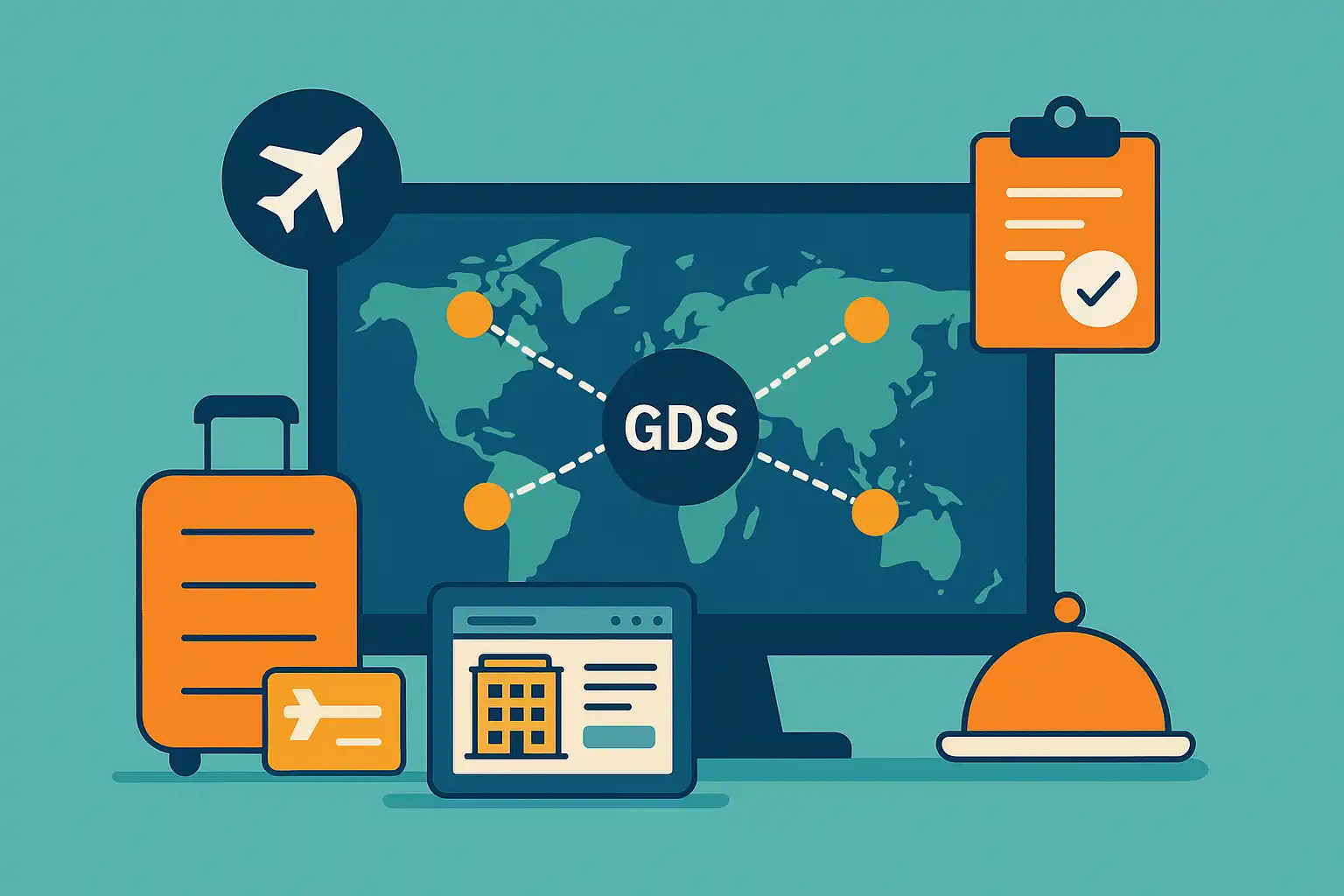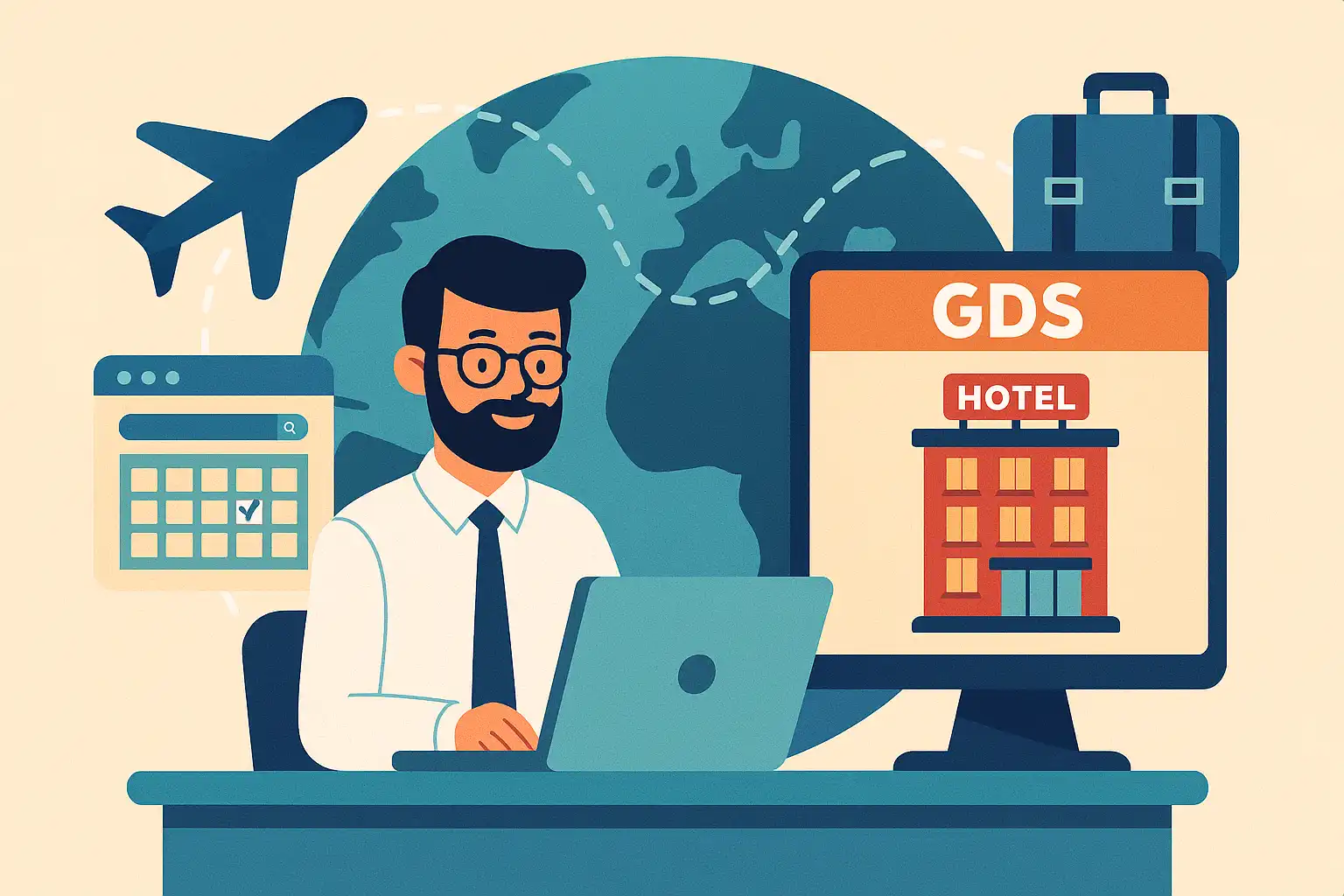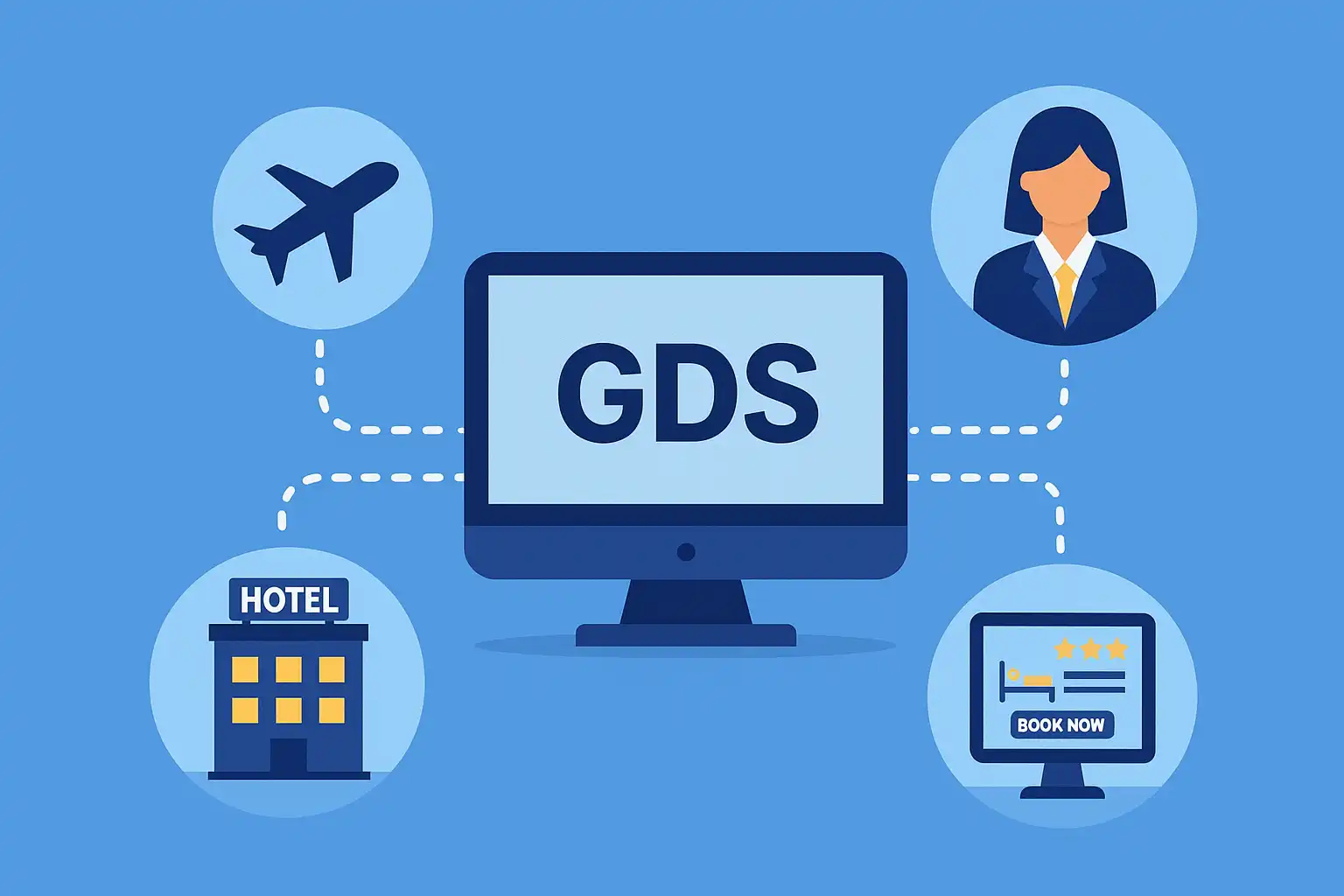Global Distribution System (GDS): Guide for Hotels and Travel Industry
 Mika Takahashi
Mika Takahashi Mika Takahashi
Mika TakahashiBack in 2019, global distribution systems handled over 2.6 billion flight segments—that's about 60% of all airline bookings made outside of airlines’ own channels. For hotels, this means billions of dollars flow through these powerful global distribution system networks that connect travel service providers with travel agencies all around the world.
Think of a global distribution system as the backbone of today’s travel industry. It makes it easy for hotels, airlines, car rental companies, and a vast network of travel agents to connect and complete bookings smoothly. Whether you're catering to corporate clients or leisure travelers, understanding how global distribution systems work and using them right can really boost your hotel’s revenue and expand your market reach.
In this guide, we’ll cover everything you need to know about global distribution systems—from the basics to advanced strategies that help your hotel shine across these essential global distribution system booking platforms.
A global distribution system is basically a computerized network that links travel service providers directly to travel agencies, corporate booking tools, and other travel sellers worldwide. Imagine it as a huge B2B marketplace where hotels, airlines, car rentals, cruise lines, and tour operators can share their inventory with thousands of travel agents all at once through the global distribution system.
Unlike online travel agencies, which mostly target leisure travelers through consumer-facing websites, a global distribution system focuses on business travel and professional travel agents. These global distribution systems give travel agents real-time access to availability, let them compare prices from multiple suppliers, and complete bookings instantly—all through one convenient interface.
The global distribution system acts as a middleman, facilitating automated booking transactions without actually holding any inventory itself. When a travel agent searches for hotel rooms through a global distribution system, the request zips through the network to your hotel’s central reservation system, retrieves up-to-the-minute availability and rates, and shows that info back to the agent in seconds.
This real-time connection has really changed the travel game by creating a standard platform where complex trips involving multiple travel services can be put together and booked smoothly. Corporate travelers especially benefit, since their travel management companies can enforce company policies, track expenses, and provide duty of care worldwide.

The tech behind global distribution systems is pretty sophisticated, with millions of data exchanges happening daily in the travel industry. When your hotel hooks up to a global distribution system platform, you’re opening a digital pipeline that lets authorized travel sellers access your inventory instantly.
Here’s how a global distribution system works: Your hotel’s property management system (PMS) handles your rates and availability. That data flows through a channel manager or direct connection to the global distribution system’s central database. Then the global distribution system shares this info with travel agents worldwide through standardized interfaces and APIs.
Here’s a typical booking in action via a global distribution system:
This smooth integration keeps bookings efficient and ensures your inventory stays accurate across all channels. With unified access via global distribution system platforms, travel agents don’t need to contact each hotel separately, which saves time and boosts booking success.
Modern global distribution systems also support smart features like dynamic pricing, where rates shift based on demand, seasons, and competitors. These revenue management tools help hotels fine-tune pricing and stay competitive across different markets.
Knowing how GDS system differs from other booking channels is key to crafting a smart distribution strategy. All channels connect hotels to guests, but they serve different markets and run on different business models.
The biggest difference is who they serve and how they operate. OTAs like Booking.com and Expedia target leisure travelers via consumer websites, while global distribution systems cater to business travel through professional travel agents and corporate booking tools.
Commission-wise, GDS bookings usually cost around 10%, which is lower than the 15-25% OTAs often charge. That makes global distribution systems a great option for hotels wanting to reduce distribution costs while reaching high-value corporate clients.
A CRS is typically run by the travel provider itself, like a hotel chain’s own system for direct bookings. A global distribution system, on the other hand, aggregates content from many suppliers. For example, a hotel might use its CRS for direct bookings but also distribute through global distribution system platforms to reach travel agencies it can’t access on its own.
Internet Distribution Systems focus on online retail channels, integrating with OTAs and direct booking engines. Global distribution systems maintain their strength in corporate travel, where travel management companies need detailed reporting, policy enforcement, and consolidated billing.
The key benefit of including a global distribution system in your distribution mix is market diversification. While OTAs attract leisure travelers hunting for deals, GDS systems connect you with corporate travelers who often book higher-rate rooms and bring in more revenue per available room.
The global GDS market is dominated by four big players that handle billions of bookings each year and connect with hundreds of thousands of travel agencies worldwide. Knowing what each global distribution system platform does best will help you pick the right ones for your hotel’s goals.
Founded in 1987 by a group of European airlines, Amadeus is now the largest global distribution system by market share, processing over 500 million bookings annually across more than 190 markets.
Amadeus is especially strong in Europe, the Middle East, Africa, and Asia Pacific, making it essential for hotels targeting international business travelers from these regions. It serves over 90,000 travel agencies and connects with more than 200,000 hotels worldwide.
Amadeus offers advanced hotel distribution tools, including dynamic pricing and detailed reporting that helps hotels understand booking trends and guest demographics. In the Asia Pacific region, it has deep reach into corporate travel programs in major hubs like Singapore, Hong Kong, and Sydney. Its multilingual and multi-currency features make it a favorite for international hotel chains.
Sabre got its start in the 1960s through a partnership between American Airlines and IBM. It was a pioneer in computerized reservation systems and remains a leading global distribution system provider, especially in North America where it dominates corporate travel.
Sabre connects over 400 airlines and 200,000 hotels, with about 425,000 travel agent terminals worldwide. Its strength lies in deep integration with travel management companies serving business travelers.
Hotels targeting business travel love Sabre because many Fortune 500 companies use Sabre-connected travel management companies for their global programs. This opens doors to high-value corporate clients through negotiated rates and group bookings.
Sabre supports flexible rate structures, policy enforcement, and detailed reporting to meet corporate travel program needs.
Travelport runs three global distribution system platforms—Galileo, Worldspan, and Apollo—each with strong regional focuses and specialties.
Galileo is big in Europe, serving hotels targeting both business and leisure travelers. It connects over 65,000 travel agencies across regions.
Worldspan has a strong foothold in the OTA sector, helping hotels keep rates and availability consistent across travel agents and online platforms.
Apollo serves North America, focusing on corporate travel programs and travel management companies. It supports complex corporate booking needs like policy compliance and consolidated reporting.
Besides the big three, there are several niche global distribution system platforms. Abacus was a major player in Asia Pacific before merging with Sabre, while Pegasus focuses on hospitality distribution for independent hotels and smaller chains.
Regional GDS systems still operate in some markets, offering deep local penetration and specialized services. These can be great for hotels targeting specific areas or traveler groups.

Using hotel GDS platforms as part of your hotel distribution strategy can have a big impact on your hotel’s revenue and reach. The benefits go well beyond just more bookings.
Global distribution system platforms connect you to over 600,000 travel agents worldwide, opening doors to corporate clients and business travelers who book through professional travel services rather than consumer websites.
This network works 24/7 across time zones, so your hotel stays visible no matter where or when agents are booking. For hotels near business districts, airports, or major cities, global distribution system access is especially valuable.
Many multinational companies require their employees to book through approved travel management companies that use global distribution systems. Staying strong on global distribution systems means tapping into this lucrative corporate market that’s tough to reach otherwise.
Business travelers booking through global distribution system platforms tend to spend 30-50% more per stay than leisure travelers using other channels. They often book longer stays, premium rooms, and extra services like meeting spaces and dining.
GDS commissions hover around 10%, lower than the 15-25% OTAs charge, which helps your bottom line.
Negotiated corporate rates through global distribution systems also bring booking stability. Many companies lock in preferred hotels with guaranteed room blocks and steady bookings at rates often above average daily rates.
Group bookings through global distribution systems often include meeting rooms, catering, and extended stays, boosting revenue beyond just rooms. Travel management companies use global distribution system interfaces to handle these complex bookings, creating more business opportunities.
Automated booking through global distribution systems reduces manual work for your reservations team and keeps transactions accurate. Real-time inventory updates prevent overbookings and cut down on manual confirmations.
With global distribution systems, you manage many travel agent relationships through a single integration, simplifying channel management and reducing technical headaches.
Built-in reporting and analytics give you valuable insights into booking patterns, market trends, and guest types, helping you make smarter pricing and marketing decisions.
Integrating global distribution systems with your property management and revenue tools creates smooth workflows and keeps data accurate across systems.
Getting connected to GDS platforms takes some planning and tech setup, but modern channel managers and integrations have made it much easier.
Most hotels connect through channel managers, which act as middlemen between your property management system and multiple distribution channels. These platforms pool your inventory and rates, then push them out to selected global distribution system networks, OTAs, and other channels all at once.
Channel managers like Prostay, TravelClick, or RateGain offer user-friendly dashboards to set rates, manage availability, and control distribution across multiple global distribution system platforms at once. This cuts down on complexity and ongoing maintenance compared to direct connections.
Larger hotel chains or high-volume properties might opt for direct connections to global distribution system platforms for more control and lower per-booking fees. This requires more tech work but offers better customization and commission deals.
The setup usually involves:
Property Data Configuration: Entering detailed info about your hotel—location, amenities, rooms, policies—into each global distribution system.
Rate Structure Development: Creating rate plans for different markets, corporate deals, and booking rules while keeping rates consistent.
Integration Testing: Making sure rates, availability, and bookings flow correctly between your systems and the global distribution system.
Certification and Go-Live: Passing global distribution system certification to confirm everything works before going live.
This process typically takes 4-8 weeks, depending on your property and integration choice. Costs vary based on whether you use channel managers, direct links, or a mix.

Modern GDS platforms come packed with features to handle complex hotel distribution while keeping operations smooth and revenue high.
Real-time rate and availability updates are a must. Your inventory must sync instantly across all travel agents to avoid overbookings and keep you competitive. Advanced global distribution systems support multiple rate categories for corporate clients, leisure travelers, and contracted deals.
Flexible rate structures let you handle corporate negotiations, group discounts, and seasonal contracts without losing rate integrity.
Booking rules let you set policies like minimum stays, advance booking deadlines, or rate restrictions for specific markets.
Reporting and analytics tools help you track booking trends, market performance, and competitor positioning. Many global distribution system platforms show which travel agencies book most, seasonal market shifts, and how you stack up against rivals.
Multi-language and multi-currency support is vital for hotels targeting international guests, ensuring accurate conversions and local relevance.
Integration with your existing hotel tech—PMS, revenue management, CRM—keeps operations efficient and data consistent.
How you use a GDS system depends a lot on your hotel’s location, market, and operations. Here’s a quick look at how different properties can get the most from global distribution systems.
Business Hotels and Airport Properties should lean heavily on global distribution systems. These hotels naturally align with corporate travel patterns and benefit from strong presence on major platforms like Sabre and Amadeus. Airport hotels especially gain from global distribution systems since business travelers often book complex itineraries through travel management companies.
Business hotels should develop negotiated corporate rates on global distribution systems, as they often serve as preferred hotels for large companies. Offering consistent rates and availability through travel agents is key to keeping these partnerships strong.
Independent Hotels might find selective global distribution system participation through aggregators or channel managers more cost-effective than full direct connections. Boutique hotels can use global distribution systems to reach corporate clients who might not find them through leisure channels, but should weigh the cost-benefit carefully.
Independent properties often do better focusing on one or two major global distribution system platforms instead of trying to cover all bases. Regional or specialized platforms may offer better value for smaller hotels.
Hotel Chains usually have enterprise-level global distribution system management with centralized rate negotiations and standardized distribution across their portfolio. Chains benefit from volume-based commission deals and brand recognition that boosts visibility.
Chains can also use sophisticated revenue management to adjust rates across global distribution system platforms based on demand and competition.
Resort Properties tend to keep global distribution system focus limited since leisure travelers mostly book through OTAs or direct. But resorts targeting corporate meetings or groups might want selective global distribution system access to reach travel planners and event organizers.
Resorts should evaluate global distribution systems based on their corporate group business potential and local business travel demand. Some may find value even if leisure is their main market.
Global distribution system platforms continue evolving fast as technology and travel trends push toward more personalized, efficient booking experiences—while keeping the broad connectivity that makes global distribution systems so valuable.
New Distribution Capability (NDC) is a big leap forward, changing how airlines and hotels share content through global distribution systems. NDC lets providers show richer details, high-quality images, and personalized offers that better match today’s complex travel products.
For hotels, NDC means better showcasing amenities, room features, and extras through global distribution systems, which should boost bookings and support smarter revenue strategies tailored to guest preferences.
AI and machine learning are playing bigger roles in how global distribution systems present content and handle bookings. AI-powered recommendations analyze travel agent habits and corporate travel trends to suggest the best hotels and pricing.
Predictive analytics help hotels anticipate demand and adjust global distribution system strategies. Machine learning finds optimal pricing based on past bookings, competitor rates, and market shifts.
Mobile-first designs and modern APIs meet growing expectations for fast, easy booking from agents and travelers.
Sustainability and ESG reporting are gaining importance in corporate travel. Many companies now require detailed reports from travel suppliers, giving eco-friendly hotels a chance to stand out on global distribution systems.
Payment tech and virtual cards integration address corporate travel needs, with many companies using virtual payments that require smooth global distribution system support.
AI-driven revenue management will make global distribution system participation even smarter, optimizing rates across channels in real-time based on booking pace, competition, and history.
Corporate travel programs demand duty of care features like real-time guest tracking and emergency alerts. Global distribution system platforms are evolving to meet these needs while respecting privacy and efficiency.
Blockchain may eventually add security and transparency to bookings, though it’s still early days. Initial uses focus on payments and identity verification.
As the travel industry recovers and evolves, global distribution systems remain a vital link between hotels and corporate travelers. Hotels that master global distribution system use and embrace new tech will stay ahead in a complex distribution landscape.
The secret to success? Treat global distribution systems as a key part of a balanced distribution strategy that includes direct bookings, OTAs, and travel agents. Hotels that find this balance while keeping operations smooth and revenue strong will thrive in the future travel market.